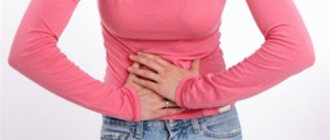No amount of technological progress or skill in handling an iPhone can protect a modern girl from the difficulties associated with growing up and maturing her body. Also, the first periods in girls cause natural fear, anxiety and a million questions.
The undoubted advantage of today is that you can find answers to all your questions by simply reading an article on the Internet.
What to do during girls' first periods
The girl should discuss all issues related to her first period with her mother.
If this is not possible - with her grandmother, aunt, sister or someone else close to her and someone she trusts. Otherwise, this stage of development can cause serious psychological discomfort to the baby and even affect her attitude towards herself and towards the opposite sex. Despite the fact that this event is joyful for many (after all, a girl becomes a girl), it is better to make it a secret. Practice shows that many teenagers are not immediately ready to notify the male half of the family, as well as other relatives, about this. The mother should not only tell in detail what is happening to the girl’s body (many people think that they are dying!), but also explain how best to use the pads, what failures can befall them in “these days.”
Expert opinion Daria Shirochina (obstetrician-gynecologist)
Under no circumstances should you leave your child alone with this question. And even such an option as “accidentally” throwing in a book about growing up will not be better than a regular conversation with your mother.
What is better to use - tampons or pads?
The classic remedy is pads. They are simple and easy to use, you can easily tell when you need to replace a hygiene product and not
However, they have a number of disadvantages:
- may cause a not very pleasant odor;
- will never be insured against leakage;
- not entirely practical at night.
Tampons do not have these inconveniences; among them there are options for virgins. However, despite this, they should not replace pads for girls 10-12 and even 14 years old. Teenagers may not be as careful about hygiene when introducing the product, forget to replace it, etc. With tampons, it is more difficult to assess the amount of blood loss.
Therefore, preference should be given to pads, you just need to choose the right ones depending on the discharge. To be on the safe side, you can purchase special menstrual panties.
Watch this video about what is better to use - tampons or pads:
What to pay attention to
With the onset of menstruation, it is necessary to monitor your reproductive health precisely by the nature of the discharge
You need to pay attention to the following points:
- whether there is pain the day before or during menstruation;
- whether they are plentiful or not;
- how many days go by;
- after what period of time they start again;
- Is there any unpleasant odor in the discharge?
Hygiene rules
During menstruation, the following rules must be observed:
- avoid overheating (in the sun, in a bathhouse, sauna) - this can provoke increased discharge;
- change hygiene products regularly - as they are full and at least every three hours;
- wash at least once, and when using pads, it is better twice a day, more often in the hot season.
Advice for girls
The first period often frightens girls; they do not know whether it is normal to discharge blood from the genital tract
It is important to understand that this is an absolutely natural stage of maturation of the female body. This is a kind of signal that a girl can continue her family line - conceive and bear a baby
Advice for girls is as follows:
Don’t be shy, don’t be afraid of “these days.” Use pads, even if you have had intimate experience. It is important to regularly keep a menstrual calendar and mark in it the beginning and end of your period, as well as the nature of your discharge. Maintain good hygiene and change pads/tampons every two to three hours. Eliminate factors during “these days” that will provoke increased discharge (intense physical activity, overheating, stress, etc.). If you have any complaints (pain, unpleasant odor, very heavy or irregular discharge), consult a doctor. We recommend reading about the causes of intermittent periods
From the article you will learn about what can provoke intermittent periods in normal conditions and in pathology, treatment of a disturbed cycle.
We recommend reading about the causes of intermittent periods. From the article you will learn about what can provoke intermittent periods in normal conditions and in pathology, treatment of a disturbed cycle.
And here is more information about how much blood is normally released during menstruation.
The first menstruation is a stage of puberty in the female body. In addition to the physiological process, at this time the girl undergoes significant psychological changes
Therefore, it is important that the girl “meet” her first menstruation with a close person who can show her and tell her all the features of the functioning of the female body
When will your first period start?
Gynecologists, based on statistics, agree that girls of the 21st century first encounter “critical days” between the ages of 11 and 16 years. The time of the first menstruation, otherwise known as “menarche,” has become significantly “younger.” Even our grandmothers and great-grandmothers learned about a similar physiological phenomenon by the age of 15–19 years. Although residents of the southern regions always entered puberty quite early. This is due to climatic conditions, nutrition and genetic predisposition.
You can take an online test for the date of your first period by clicking on the link.
The timing of your period may depend on the factors listed below.
Hereditary predisposition
The intensity and amount of discharge on the days of menstruation, as well as their beginning and the period of menopause, has a hereditary “shade” and is transmitted through the female line. Gynecologists, answering the question: “How long do girls’ periods last,” conduct a “birth history.” Most often, the mother of the young patient is interviewed. Based on the data obtained, the doctor can determine as accurately as possible the age at which the girl will become a girl.
Nutrition
As you know, a person is what he is. A girl’s nutrition during the development of her body directly affects the first menarche. Those girls whose diet contained a large amount of meat, mainly beef, and fresh vegetables and fruits, can experience menstruation as early as 9–12 years old.
Girl's lifestyle
Gynecologists have long noticed a direct relationship between menstruation and the lifestyle followed by a teenager. The presence of a sufficient amount of physical activity in life and an addiction to a balanced diet reduce the pain of menarche and speed up its onset. The presence of excess weight and the predominance of fats, carcinogens and fast carbohydrates in a girl’s diet will negatively affect the beginning of the menstrual cycle. It will be characterized by pain, late onset and long-term instability.
Terrain
The climatic features of the girl’s area of residence also leaves an imprint on the beginning and end of menstruation. The length of daylight hours, the amount of natural vitamin B received, and the predominance of a certain time of year directly affect menarche.
The presence of pathological processes in the body
Dysfunction of the thyroid system, heart disease, diabetes mellitus, congenital malformations associated with atypical functioning of the kidneys, adrenal glands, and reproductive organs can significantly delay the onset of the first menstruation. If there are such deviations, specialized specialists: nephrologists, gynecologists or endocrinologists, prescribe girls a course of maintenance therapy, including hormonal drugs.
How long does your period last?
So, how do normal periods go? Let's start with the fact that menarche, that is, the first menstruation, does not last long, only a couple of days. There is practically no blood (just a couple of drops), as a rule, this is a “daub”. A normal cycle will be established only after a year and a half.
Please note that the established cycle should not be disrupted throughout the entire childbearing period of a woman’s life
This is very important, if there are deviations, it is better to visit a gynecologist
How long do periods last? 10 days, 7 or 2 – these are all normal limits. For some, they pass quickly enough, but there are cases when menstruation lasts up to ten days. There is no need to worry about this, because each organism is individual. Below are some norms regarding menstruation; if you do not have any deviations from them, then consider that you are completely healthy:
The cycle should range from twenty to thirty-five days. The “lunar cycle” is common and, according to gynecologists, the most successful (28 days). On average, women's periods last five days, but the norm is two to ten days. The intensity of bleeding should decrease by the last day of menstruation. This is quite difficult to determine, but, nevertheless, there is a norm of blood loss
Be sure to pay attention to the intensity of the discharge; during the entire cycle you should not lose more than 60 milliliters of blood. This amount is optimal; the woman does not feel any discomfort or malaise, because the loss is quickly restored by the body.
If you don't have your period
The absence of menstruation before the age of 18–20 is a serious reason to consult a specialist. If such a long delay is not associated with a hereditary predisposition, the gynecologist may prescribe a number of diagnostic procedures aimed at identifying the cause. Among the main manipulations necessary for taking an anamnesis are:
- gynecological examination;
- general blood analysis;
- general urine analysis;
- Ultrasound of the pelvic organs;
- analysis of hormones from a vein.
The results of these diagnostic procedures will shed light on the general condition of the girl and on the pathological processes that prevent menarche.
Please note that when the doctor collects an anamnesis, it is necessary to mention serious illnesses suffered by the girl in childhood: bronchitis, traumatic brain injuries, pyelonephritis, encephalitis and meningitis can have a significant impact on the formation of the menstrual cycle.
In the middle zone, girls experience menarche at 14 years of age.
What factors accelerate or delay the onset of menarche?
Menarche should normally begin between the ages of 11 and 15; the following factors can hasten or slow down its onset:
- genetic inheritance. If women in the family began menstruation earlier or later than standard norms (especially the mother), then in a teenager these deviations are not considered a pathology;
- body type. For overweight girls, menstruation usually begins earlier than for their peers; for thin girls, on the contrary, it starts later. Therefore, a normal physique at a given age plays an important role;
- state of the nervous system. Frequent psychological overload, stress and depression can both accelerate and slow down the onset of menarche. In adolescence, girls are often psychologically unbalanced, as they begin to worry about their appearance, developing themselves as individuals, as well as heavy school pressures. Therefore, during this period, it is recommended to give children Glycine, Vitamin E and other sedatives without a hypnotic effect (only after consultation with a specialist);
- physical exercise. Sports and dancing can also cause early/late menstruation;
- food ration. For normal development, a teenager must receive sufficient amounts of vitamins and minerals from food. If they are deficient, menstruation will begin with a delay. The lack of nutrients in food can be compensated by taking vitamin complexes;
- state of immunity and reproductive organs. If the body is severely weakened, severe viral pathologies with complications have been suffered, or there were injuries to the organs of the reproductive system in childhood, then the onset of menstruation is often delayed;
- taking medications. Hormonal drugs and antibiotics especially affect the onset of menstruation (they weaken the immune system).
In order for menarche to occur on time, it is necessary to have proper nutrition, limit stressful situations and increased physical activity, and also promptly eliminate infectious and endocrine pathologies. But if there is a possibility of late menstruation along the hereditary line, then this factor cannot be changed.
Features of the first menstruation in girls. Puberty
Girls begin their periods between the ages of 12 and 14.
However, sometimes earlier or later menarche (first menstruation) is normal. Typically, girls begin menstruating around the same age as their mothers. And in the last 10-20 years, girls have experienced earlier puberty. Most likely, this is due to proper nutrition and lifestyle. The girl is not starving, which means she produces the main female hormone, estrogen, in normal concentrations, which regulates puberty and subsequently affects the reproductive system. The first menstruation in girls always occurs after the formation of secondary sexual characteristics. From about 9 years old, girls begin to grow quickly (they often outstrip boys in height). They develop hair under their arms, dark hair on their legs and pubic area, and sometimes on their chin and above their lips. Then (no more than 2-3 years later) menstruation begins. Before this crucial moment, the girl may develop acne on her face and small transparent discharge from her nipples. By this time, mothers should already explain to their daughters what changes are happening in their bodies, what girls’ periods are like, what their cyclicity is and, of course, about hygiene on menstruation days.
Despite the fact that now there are mini tampons that can be used by virgins, preference should be given to good sanitary pads. Mothers should take care in advance that their daughters do not lack these hygiene products, since even with scanty menstruation, pads need to be changed at least 2 times a day.
What to do if periods are often delayed in 11- and 12-year-old girls? We are accustomed to the fact that menstruation should come regularly, and even small deviations from the norm indicate some kind of problem in the body. But things are different for teenage girls. 2-3 years after menarche, the cycle will be established, that is, menstruation may begin a little earlier and a little later, be abundant in one month, and scanty in another, as well as painful. You shouldn’t get used to the pain; you can talk to your doctor about the possibility of taking antispasmodics on menstrual periods. Scanty periods are not a big deal either. But abundant ones can be dangerous if they are really very abundant. It is dangerous if gaskets have to be changed more often than once every 2-3 hours. You should also consult a doctor if there are delays longer than 3 months (the reason for this is often following strict diets for weight loss), prolonged menstruation (longer than 7 days), and if the intervals between monthly bleeding are less than 21 days.
Girls 15 years of age and older have periods that are more regular. By this time, puberty is slowly ending. By the age of 18-20, girls have a formed figure according to the female type, a regular menstrual cycle and can conceive and bear a child without difficulties or complications.
Interesting off-topic video:
“No hot foot baths, no heating pads, no ice on the belly. »
– Are your first periods painful?
– The first menstruation should not be painful. If this happens, I advise you once again - be sure to go to the doctor! There can be many reasons, including underdevelopment of the reproductive system.
– Are there any physiological reasons for the occurrence of severe painful sensations?
– In an adult woman, the endometrium in the uterine cavity seems to fragment and come out in “pieces”. And in girls, the bend between the cervix and the body of the uterus is quite sharp, and the inner layer, separated by a “cast” and not fragments, gets stuck at the exit from the uterus. The uterus must contract vigorously to push all this out. These increased contractions of the uterus are perceived by girls as pain. What can you do? Try to find a position during which this pain goes away. Either lie on your stomach or take a knee-elbow position.
– Can medications be used to relieve pain?
” – Grandmothers used to say that “we need to warm our feet.” In fact, this should never be done if you have pain during menstruation! No hot foot baths, no heating pads, no ice on your belly!
– It was once believed that antispasmodic drugs, such as no-shpa, helped a lot, we used them quite widely. They helped some, not so much for others. Today, the best drugs for painful periods are non-steroidal anti-inflammatory drugs based on indomethacin, mefinamic acid: nise, ketonal (namely ketonal, not ketanov!) That is, drugs that act on pain mediators and relieve inflammation.
” – If the pain lasts an hour or two, then this is normal. The girl drank tea, lay down, got distracted, and the pain went away. But if the pain syndrome is pronounced and it lasts more than a day, then you need to take pain relief. The pain cannot be tolerated.
Very often, girls who have problems with neurology perceive this pain more acutely. Some complain (in addition to pain in the lower abdomen) of nausea, vomiting, dizziness, even fainting. In this situation, you definitely need the help of a neurologist. You need to contact a specialist twice a year, carry out treatment that improves cerebral circulation, you may need courses of sedatives and physical therapy. All this is indirectly aimed at pain relief.
POSSIBLE CONTRAINDICATIONS, SPECIALIST CONSULTATION REQUIRED
– What is considered heavy and scanty discharge in girls?
” – During menstruation, no more than 80 grams of blood should be released. One pack of pads should be used for the entire menstrual period.
– As a rule, in adolescence, complaints about scanty discharge are extremely rare - this is the prerogative of older people. Most often, the root of the problem lies in an increase in male sex hormones. Menstruation that lasts less than 2-3 days is also a violation, as is menstruation, during which there is little discharge.
– If the pads are changed within an hour and a half, this already indicates bleeding . Bleeding is dangerous due to anemia, a drop in hemoglobin levels, and many other problems can arise against this background. Heavy menstruation should suggest that there are problems with blood clotting, possibly related to heredity. We have laboratories in our city that study hemostasis, including at the genetic level. It is necessary to identify the causes and then choose treatment tactics. Such an analysis is performed once in a lifetime, and a girl who will become pregnant and give birth in the future should be aware of the existence of these problems.
Menstrual cycle in teenagers
The menstrual cycle in teenagers has its own characteristics, and we will talk about them now. Before the onset of menstruation, a girl’s body undergoes hormonal changes that lead to the appearance of the first symptoms of sexual development and, as a result of all changes, the girl begins menstruation, which indicates the sexual readiness of the body and its maturity.
After the first menstruation, the cycle is not established immediately, which is a variant of the norm, because the formation of the menstrual cycle is a long process.
Menstruation in adolescents begins on average at 12–15 years of age, but before this, a couple of years before their onset, breast growth is noted. An unstable menstrual cycle in a girl is associated with the development of hormonal levels and normally can be no more than two years old, while menstruation should be no more than seven days, painless, not exceed 150 ml of blood loss, without large clots. If this has been observed for two or more years, then you should consult a doctor. The teenage period is characterized by a lengthening of the menstrual cycle to two or more months, since in women of reproductive age it ranges from 21 to 35 days. If we talk about the possibility of pregnancy immediately after menarche, then it is practically absent, because the cycle in adolescents is anovulatory, and, therefore, the maturation of the egg does not occur.
Menstruation in adolescents often has disruptions, which leads to changes in their duration, changes in the amount of blood lost, and also changes in the feeling of menstruation. If a girl has never had a period and is 15 years old, then we should talk about primary amenorrhea. If more than 6 months have passed since the first menstruation, then this is a sign of secondary amenorrhea. If the time interval between menstruation takes more than 35 days, then in this case they talk about oligomenorrhea, but if less than 21 days pass between menstruation, then it is polymenorrhea. There may be disturbances in the amount of blood lost, and they may be abundant, scanty, or there may be juvenile bleeding that requires hormonal correction.
Disorders of the menstrual cycle: the causes in adolescents can be very diverse. In case of primary amenorrhea, first of all, pathology of the hypothalamic-pituitary system, central nervous system, endocrine system or congenital malformations of the reproductive organs is excluded.
The most common causes of secondary amenorrhea are hyperandrogenism, hyperprolactinemia, insufficient ovarian function, pathology of the nervous or mental systems, as well as brain tumors, pathology of the endocrine system or metabolic system.
Any irregularities in the menstrual cycle in a girl in adolescence for more than two years, or those that lead to the development of pathological symptoms, should be consulted by a gynecologist to determine the cause of the disturbances and, if necessary, treatment must be started in a timely manner, which will prevent the development of infertility and other issues.
“A daughter with all problems should turn to her mother for help and advice. »
– There are now a lot of personal hygiene products available that can be used during menstruation. How not to drown in this sea of gaskets? How to choose them correctly? Can a girl use tampons?
– For girls who are not sexually active, using tampons is strictly not recommended. A tampon that has been in the genital tract for some time swells. The infection “clings” to it, and besides, removing it can damage the hymen. Some young athletes, however, try to use tampons, sometimes successfully, but here everything is very individual.
” – Teenage girls, as a rule, do not yet have the same self-control as an adult woman; they can simply forget about the tampon. And he should stay in the genital tract for no more than one and a half hours, maximum 2.5 hours.
– Recently, girls who have inflammatory processes in the external genital organs have often come to see us. And they are often caused by allergies! Therefore, I recommend choosing hypoallergenic pads for the first menstruation. According to my personal observations, Discreet, Milana, and Naturella pads performed best in this regard. If there is no allergic reaction, then, of course, you can use whatever you want, including pads with fragrances.
– A girl’s mother should be a friend, so that her daughter turns to her for help and advice with all her problems. Of course, you need to talk about menstruation long before its appearance (family psychologist Ksenia Salakhutdinova explains how to do this in her memoir letter “To teenage girls about their first periods” ). During the first period, you need to help with hygiene, and also teach the girl how to keep a menstrual calendar! A girl must come to an appointment with a gynecologist with a menstrual calendar, where she must mark the days of her menstruation - then you can immediately see how regular the cycle is. I convince all my patients, especially young ones, to keep such a calendar, and as a doctor I ask mothers to pay special attention to this!
Good luck and health to you!
Sibmama’s project “How to Preserve the Health of a Schoolchild” is a series of meetings with leading doctors in Novosibirsk who advise siblings on the health of their children. The general partner of the project is the Blesk network of clinics.
Girls' first menstruation, scientifically called menarche, is an exciting period. At this point, the lack of knowledge in this area is alarming. Simple questions arise, and they need answers. How to understand that “guests will arrive in a red car”, what are the symptoms, what should you be able to do before and during menstruation, what is the duration, and so on. Now we will try to answer these questions.
How men's periods go
Day “X” for men usually occurs when their emotional background is at the peak of excitability and they are very unrestrained. This is menstruation, but not in the literal sense of the word, but figuratively. During “critical days,” a young man may be aggressive towards comrades, loved ones and animals. They cannot even explain their behavior to themselves. Older boys find it difficult to control their emotions. They lose the desire to play sports, nothing works out as planned, and they tend to blame everyone around them for this. If this behavior is repeated once a month, these are “monthly” emotional days.
Older men on such days of the cycle are not collected, absent-minded and gloomy. They quickly become tired and want to sleep. Sometimes sexual desire even disappears, which is associated with hormonal changes that occur in cycles in the body of men.
Biographers met with famous male representatives. For example, Napoleon fell into hysterics every month, complained of abdominal pain and felt unwell. It is also known that Hitler’s office kept a “women’s” calendar for its boss. On such days they tried to avoid meeting him. The tantrums were repeated every month, and the behavior was depressive.
During menstruation, it is advisable for men to beware of cuts, since the bleeding at this time cannot be stopped for a long time. Even a small wound can cause large blood loss. During such a period, it is better not to touch men; later they will do the work much faster and with better quality. After critical days, your mood improves, depression goes away and pain disappears.
It is not at all dangerous for men. A biological individual is characterized by a certain cyclicity or biorhythms, which manifest themselves in the psychological behavior of a man or woman. Scientists say that the norm is 2-3 days in 30-45 days. When there is a hormonal imbalance in a man's body, emotional outbursts may appear more often. It's all about increased levels of female hormones. Estrogen suppresses the effect of testosterone, men feel weakened, gain weight sharply, and problems with blood vessels appear. Menstruation for men is a periodic change in hormonal composition, which affects the emotional background and physical health. Intellectual work contributes to a greater manifestation of PMS in both women and men. And during physical work, minor ailments appear much less often.
There is an opinion that PMS affects the sexual needs of the male population. In young people, sexual activity is stable, hormones work in a 24-hour cycle, and sexual ability does not depend on mood. With age, the connection between sexual biorhythms and the functioning of the endocrine system, nervous and emotional overload becomes more noticeable. The endocrine glands influence seasonal and cyclical changes in the levels of hormones that are responsible for sexual desire and performance. Physical condition and emotional components greatly influence the partner’s sexual activity. The influence of menstruation on attraction to the opposite sex is already being monitored here. A man's sexual function is slightly weakened for 2-3 days, then everything returns to normal.
As you can see, men's periods still have a certain rational meaning. This expression should not be taken literally, but it is also necessary to know about it. This will help you understand your body much better, and also maintain your health for many years, because with knowledge about the structure of your body it is much easier to monitor your well-being.
It might be useful to read:
- Alopecia, Diseases and treatment with folk remedies and medicines;
- On the establishment of the Voronezh Regional Clinical Dental Clinic;
- Timing of vaccination against ticks for people and how much it costs Method of administration of the tick vaccine;
- Tick-e-vac tick-borne encephalitis vaccine culture purified concentrated inactivated sorbed Vaccination against tick-borne encephalitis storage;
- Cefuroxime: instructions for use Cefuroxime original drug;
- Medicinal reference book geotar;
- How and how to treat chronic bronchitis of a smoker? ;
- Hip dysplasia in newborns, signs in infants Inguinal hernia in men ICD 10;
Hygiene during menstruation
Mothers should also tell their daughters that maintaining hygiene during menstruation is mandatory. All women and girls use pads or tampons during menstruation. For girls, the latter are the most preferable; they are more convenient to use. The pads must have a cotton layer. Synthetic coverings may cause sweating and irritation and are not recommended.
Gaskets need to be changed every 2-3 hours. You should not contribute to the rapid development of bacteria - the longer the gasket is not replaced with a new one, the more serious the harm done to the body. If you do not replace the hygiene product after 6 or more hours of use, an infectious-toxic shock may occur. At the same time, body temperature rises, blood pressure drops, confusion and even coma are possible.
What else you need to consider about using gaskets:
- Before and after changing hygiene products, you should wash your hands to avoid infection;
- Do not use gaskets whose expiration date has expired (the degree of protection is reduced);
- It is not recommended to use scented pads, as aromatic components can cause allergies and irritation;
- do not save on purchases, since cheap hygiene products use low-quality raw materials;
- Pads cannot be stored in the bathroom, as high humidity is an ideal environment for microorganisms.
A girl should wear underwear made from natural fabrics. Thongs are not recommended, as this can provoke the development of infectious and inflammatory diseases.
The mother must explain to her daughter that it is strictly forbidden to take a bath during menstruation. The best option for bathing is taking a shower every day. In addition, during the day the girl should wash herself 2-3 times, preferably without using soap. Doctors recommend using gels or mousses containing lactic acid as a detergent. They do not have a negative effect on microflora, unlike soap.
You should not engage in sports or other physical activities. You can do light exercises and health-improving exercises. It is advisable to provide the girl with psychological peace during this period.
Following a diet during menstruation is important. Alcohol and spicy foods should be avoided as they promote blood flow to the uterus.
And this threatens to increase uterine bleeding.
Menstruation process
Menstruation is a discharge from the vagina of blood and remnants of the uterine mucosa that comes every 3-4 weeks
It is important that the girl knows about the structure and functioning of her body in advance. Since with the onset of cyclic bleeding a girl can become pregnant
Three phases
The menstrual cycle includes three phases (follicular, ovulation, luteal). During different periods of menstruation, different gonadotropic hormones are released into the blood. For a normal cycle, the hypothalamus and pituitary gland must function, which regulate the activity of the female reproductive system.
Periods of menstruation:
- Bleeding occurs (removal of the mucous layer from the uterus). The growth of follicular cells is stimulated using follicle-stimulating hormone. The concentration of estrogen in the circulating blood increases. The period lasts 7−20 days.
- The release of an egg from a mature follicle with the help of luteinizing hormone. The period usually begins on the 14th day.
- The period of formation of the follicular cell of the corpus luteum, which actively produces progesterone. At the end of the phase, PMS may occur.
Thus, cyclical changes in the female body occur due to gonadotropic hormones produced by the pituitary gland. A girl can become pregnant only during the period of production of a high concentration of luteinizing hormone. And bleeding from the vagina occurs if fertilization has not occurred.
Disorders in girls
Often in girls, menstruation does not come on time, which can signal not only pregnancy, but also deviations in the functioning of the endocrine glands. If the cycle is irregular, then you should consult a gynecologist.
Signs of cycle disruption:
- absence of cyclic bleeding (amenorrhea). The primary form is diagnosed in adolescents aged 16−18 years. The secondary form is the disappearance of menstruation for 6 months in girls with a regular cycle;
- heavy menstrual bleeding (menorrhagia);
- scanty periods (hypomenorrhea);
- menstruation, which is accompanied by severe pain (dysmenorrhea);
- menstruation that occurs once every 70-80 days (oligomenorrhea);
- unidentified menstrual flow (metrorrhagia).
The first cyclical bleeding from the vagina can cause fear in a teenager. The mother should familiarize the girl with physiological changes and teach her to use protective equipment. Hygiene rules will help a girl avoid diseases of the genitourinary system.
What are periods (menstruation)?
Menstruation, or from the medical side menstruation, is the shedding of the endometrium (the mucous membrane of the inner layer of the uterus), a rhythmic process that repeats at certain intervals. Menstruation is the completion of a physiological process - the menstrual cycle, which lasts 3-4 weeks.
During puberty, the hypothalamus and pituitary gland begin to produce gonadotropic hormones (FSH-follicle-stimulating hormone and LH-luteinizing hormone), which trigger the mechanism of follicle growth, steroid production and egg maturation. In the mucous membranes of the uterus, vagina, and cervical canal, cyclic changes occur that correspond to the phases of the menstrual cycle.
Cycle phases
The menstrual cycle has several phases.
- The phase of endometrial rejection, which has individual durations from one day to several days. This is a very complex process, after which the process of endometrial growth immediately begins, which occurs with extraordinary speed.
- Next, the proliferation phase begins (with a normal 4-day cycle) begins on the 5th day and lasts until the 14th day of the menstrual cycle. Every day the process of endometrial growth increases, and by the end of the proliferation phase, the growth of the endometrium in thickness reaches its maximum.
- After the proliferation phase, the secretion phase will begin from the 15th to the 28th day of the menstrual cycle. In this phase, the growth of the endometrium stops and its preparation begins for the reception of a fertilized egg, or for rejection (if fertilization of the egg does not occur).
It should be noted that menstruation is not only changes that occur in the reproductive organ - the uterus, but manifestations of changes in the whole organism.
Changes in the body
Before the onset of menstruation, the body signals this with various manifestations, including:
- nagging pain in the lower back and sacrum;
- headache;
- feeling overwhelmed;
- tension in the nipples;
- weight gain;
- in many girls and young women, a few days before the onset of menstruation, heavy mucous discharge begins;
- possible, but not always, increased body temperature, fluctuations in blood pressure.
In addition to the above changes, the first signs of menstruation in girls can be manifested by changes in the psychological sphere: weakening of memory, irritability, tearfulness, insomnia.
The amount of blood released during menstruation, on average, ranges from 50 ml to 150 ml. Menstrual blood is darker, unlike arterial or venous blood.
In the first 1.5 years after menarche, the frequency of cycles with ovulation (that is, cycles in which the egg matures) reaches 60%. In 1/3 of girls, the first 3-5 years after menarche, menstrual cycles are characterized by insufficiency of the corpus luteum, but most often the cycles are anovulatory. This explains the high incidence of dysfunctional uterine bleeding during puberty.
Physiological changes in a teenager
Significant changes in the structure and physiology of the female body occur between the ages of 10 and 16 years. The mammary glands enlarge (10-12 years), hair appears in the armpits and pubic area. Thanks to sex hormones, adipose tissue in girls is localized in the thigh area. This often causes embarrassment for a teenager, so it is necessary to have sensitive conversations about sexual development.
In the middle of puberty, a girl begins her first menstruation (usually 11-14 years). A deviation from the norm is considered to be the early arrival of menstruation (9 years) and the late arrival (15-16 years). The absence of menarche and other signs of puberty is a reason to consult an endocrinologist and gynecologist. Factors that influence the onset of menstruation:
- hereditary predisposition;
- city ecology;
- condition of the endocrine glands;
- sports training;
- the amount of vitamins and macroelements that enter the girl’s body;
- previous diseases.
The beginning of critical days
Experts say that premenstrual syndrome (PMS) can appear in a girl 3-4 days before menarche. Due to hormonal changes, frequent mood changes occur, irritability and apathy appear. PMS symptoms disappear with the onset of menstrual flow. In girls, menstruation first begins as small reddish spots on their underwear. Some teenagers notice pain in the abdomen and chest during their period.
The work of the lunar cycle is controlled by biologically active substances. A girl's first period begins when the hypothalamus and pituitary gland begin to release gonadotropic hormones into the blood. The main function of follicle-stimulating hormone (FSH) is to stimulate folliculogenesis in oocytes. A mature follicle stimulates the production of estrogens and androgens. Luteinizing hormone (LH) promotes the activation of ovulation of follicular cells. At the site of the ruptured follicle, a corpus luteum is formed, which produces hormones (progesterone and estrogen).
Establishing a cycle
Typically, menstrual bleeding lasts 3-7 days and may be accompanied by pain in the lower abdomen. All physiological processes are strictly individual, so it is impossible to say exactly how long girls’ first periods last. The menstrual cycle without deviations is 20−35 days. This is the time from the beginning of the first bloody vaginal discharge to the beginning of the next. Within one year the cycle should be established, otherwise the girl needs to be shown to a gynecologist.
To find out how long a teenager’s cycle will be, you need to keep a calendar record. On your personal calendar you can note the abundance of bloody discharge and the girl’s feelings on her menstrual days. Using the calendar method, women can avoid unwanted pregnancy, but the method does not provide a 100% guarantee and is unreliable.
Nature of the discharge
Typically, girls' periods first begin as spots of bright red or brown color. Menstrual bleeding includes blood, debris from the lining of the uterus, and vaginal discharge. On average, the endometrium in the uterus is completely renewed in 3-6 days.
If your period lasts more than 7 days:
- a large amount of female hormone (estrogen) is produced;
- the uterine myometrium does not contract rhythmically.
If menstruation lasts less than 2 days:
- dysfunction of the female reproductive glands;
- a small amount of progesterone and estrogen in the circulating blood.
Signs of the onset of critical days
If a mother monitors the health and condition of her daughter, then she will easily notice the signs that indicate the imminent onset of menstruation in girls. As soon as the signs become noticeable, it is necessary to prepare the child for a new stage of life. A few years before this moment, the figure changes a little: the hips increase and the breasts grow. Hair growth begins in the pubic and axillary areas. Acne appears on the back and face.
A few months before the onset of the first menstruation, atypical discharge appears on panties, which has no odor. Their color can be whitish, yellowish or transparent. These signs are considered normal. Therefore, you should not worry and run to the doctor if you suspect a pathology.
But it is necessary to visit a gynecologist if the discharge has an unpleasant odor, and the intimate area begins to itch.
A few days before the arrival of menstruation, girls may notice symptoms of premenstrual syndrome , which appear in almost every adult woman:
- There is a nagging pain in the lower abdomen.
- Unreasonable headaches and dizziness.
- Aggression or apathy.
- Tearfulness and frequent mood swings.










